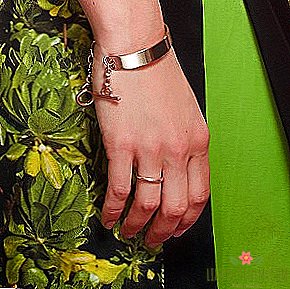Journalist Alisa Ivanitskaya about favorite books
IN BACKGROUND "BOOK SHELF" we ask journalists, writers, scholars, curators, and other heroines about their literary preferences and publications, which occupy an important place in their bookcase. Today, journalist Alisa Ivanitskaya, the author of the Big City and the Kommersant newspaper, shares her stories about favorite books.

 I started reading from boredom. It was the beginning of the 90s. My parents went to Moscow to start a business on the Moscow Commodity Exchange, and for five years I lived with my grandmother in Belarus. She was a doctor and spent half a day in the clinic, half a day with me. When it was not, I had two entertainments: a TV with three channels, through which the programs did not always go, and reading. All the books were still my mother's - collections of fairy tales, with pictures and without, the author and the peoples of the world. Favorite heroes were always Cipollino fighting for justice and resilient, strong Peppi Longstocking.
I started reading from boredom. It was the beginning of the 90s. My parents went to Moscow to start a business on the Moscow Commodity Exchange, and for five years I lived with my grandmother in Belarus. She was a doctor and spent half a day in the clinic, half a day with me. When it was not, I had two entertainments: a TV with three channels, through which the programs did not always go, and reading. All the books were still my mother's - collections of fairy tales, with pictures and without, the author and the peoples of the world. Favorite heroes were always Cipollino fighting for justice and resilient, strong Peppi Longstocking.
Before school, I fell in love with poetry. Among the books we had two pocket collections - one of Blok, the other of Gumilev. The bloc infuriated me with infinity of sentences, and from Gumilev at seven years I went crazy, completely unaware of even half the words in his poems: “bonbonniere”, “bookcase”, “tanks on silk”. But in all this incomprehensible, but so short, dynamic was magic. And still he is one of the most beloved poets, because he reads "poems to dragons, waterfalls and clouds."
In this love of poetry there was a lot of the spirit of the times. Having reached the forbidden or difficult to read, my parents and their friends swallowed the silver age, dissident literature, foreign prose. And then they wanted to teach children new, non-Soviet. For example, an elementary school reading textbook was experimental - “Sun Droplets”. There was Balmont, Pasternak, the Hobbits and Japanese fairy tales.
For a long time it seemed to me that one could find the perfect book, that is, the one that I had read and understood everything. And at 14, I found it. It was Marquez’s “One Hundred Years of Solitude”. This book is a stream, a round dance of strange destinies, and if you read it once, then you can reread it from any place until you reach the passionate, sad and liberating finale.
In Moscow, I almost never buy books, because they always have no place to store. But if I'm going to Germany, the homeland of the Taschen publishing house, I drag very heavy photographic and art albums and something else - read in German. To buy, as it seems to me, it is possible and necessary for something that will please: beautifully designed editions, graphic novels, unusual collections, second-hand rarities. The rest can be read from the reader or taken in the library. Now it is almost synonymous. For example, the library of the American Center gives out electronic copies from Amazon: you press a button - and on your Kindle for three weeks a modern non-fiction or works of laureates of literary or journalistic awards appear. Much of this has not been translated into Russian.
I know English and German, so I prefer the originals in these languages to translations. In general, my reading is chaotic: I read everything that seems curious to me, and I do not worry at all if I cannot wade through some kind of book. Pasternak taught me that. "Doctor Zhivago" I could not read for ten years, did not go, but a year ago we met, and I did not believe that he was so short and swift. There is another reading rule, a friend taught me: difficult and depressive books should be read in the summer, when life is good, it will be harder to overcome them in the winter.
Reading for me is pleasure and relaxation. I absolutely can not take it as a serious matter, so I feel guilty if I read instead of affairs. So it turns out that I read on the road. Sometimes it is so exciting that I walk down the street with an open reader, like Disney's Belle from Beauty and the Beast.
My favorite genre is memoirs. They are stronger and more fantastic than any fiction. If they are frank, then most often they are hard: people seldom describe carelessness, basically fix a difficult and painful experience. Although reading the memories is bitter, there is a lot of pleasant truth in them: the person is stronger than it seems, and dignity is the most precious thing. I recognize people through books, so if I like someone, I ask his advice. I read both with my own and with his eyes, trying to understand what was hooked. I was lucky with family and friends, I rarely disappointed someone's choice.

Richard Dawkins
"Extended Phenotype"
This is the book of the end of 1989, one of the first Dawkins monographs. Nevertheless, the Russian mass reader found out about it only at the end of the 2000s. Such a lag is insulting, because the book is accessible, fun and informative. In short, it is about how evolution went: about its accidents and patterns. Along the way, Dawkins explains the basic concepts of genetics and talks a lot about animal behavior. For example, I was surprised that the length of the DNA is in no way connected with the complexity of the organism. In humans, the genome is 20 times shorter than that of a salamander, although in every feature film, when they want to show a complex organism, they demonstrate incredible DNA.
Caitlin freeman
"Modern Art Desserts"
Caitlin Freeman has gone from being a self-taught pastry chef to a chef deserts at the cafe at the Museum of Modern Art in San Francisco. Her most famous invention is “Mondrian Cake”: a square chocolate cake that repeats “Composition with red, blue and yellow” by Pete Mondrian in section. Each recipe is, in addition to instructions, another story about a work of art and the process of its transformation into a dessert. The portrait of Elizabeth Taylor of Warhol, for example, became jelly, because Warhol printed on canvases, and striped jelly reminded of the consistent application of ink during printing. However, it is more pleasant to read a book than to cook it: recipes are laborious, so they are suitable only for special occasions. But I learned what is called, listen to the cake - it turns out that the baking readiness can be assessed not only with a toothpick, but also simply by listening: the baked dough behaves quietly.
Amos oz
"The Tale of Love and Darkness"
The autobiographical novel of Amos Oz, family history against the background of tectonic historical changes: the collapse of empires, two world wars, the proclamation of Israel, the Arab-Israeli conflict. Oz described with humor and tenderness the world of amazing people who survived without refrigerators, on frozen herring and ersatz coffee, who knew five languages and spoke a wild mix of Hebrew, Yiddish and Russian, or, like grandfather Alexander, who knew the joys of sex in 70 years. Perhaps the best recommendation would be that I read almost all of this book from the screen of a smartphone and was endlessly surprised that it contains more than 700 pages. Now I have my own copy.
Klaus mann
"Mephisto: Roman einer Karriere"
The protagonist is the brilliant actor Hendrik Höfgen. More than anything, he wants to realize his talent. But he builds a career when Germany turns from the Weimar Republic into the Third Reich. Hendrik has to choose all the time: for the sake of a career (and a quiet life), he refuses to be attached to black Venus, breaks ties with friends. So, step by step, our Hendrick becomes a symbol of the totalitarian regime.
This book is about the fact that genius is not an indulgence, that one cannot proudly say: "I am a bastard, but a great actor." It is about the doom of passive complicity - to avoid guilt will not work. But it is also about how great people are pitiful, about the difficult moral choice between conscience and talent, about the fact that, in general, not everyone is capable of it. "What do they all want from me, I'm just an actor?" - I remember this phrase every time when some previously considered decent cultural figure stumbles ethically. I would never want to be at Hendrick's place.
Valeria Novodvorskaya
"On the other side of despair"
Fortunately, there are people with a heightened sense of justice and an integrated ethical compass. They can not be caught in the verbal traps. Novodvorskaya was just that. "On the other side of despair" - memories of early ending youth. At 17, she decided to fight the regime and began to “pollinate” the entrances with anti-Soviet leaflets. She wanted the fate of Joan of Arc, fiery speeches in the square. It all ended with a punitive psychiatry, forever undermined by health and gray hair at the age of twenty. The most amazing thing is that, in spite of all the horror described, these are very funny and witty memories. My mother advised them to me, these and two thousand more memories of dissidents and GULAG prisoners are on the website of the Sakharov Center.
Anne applebaum
"Gulag Voices: An Anthology"
It is very strange and unnatural to read memories written in Russian in an English translation, but in this collection I liked the choice of material: each of the 13 stories is given in a small fragment. The first - Dmitry Likhachev - the arrest, the American Alexander Dolgun - the result (his memories in general adventure detective story), and so on, the last prisoner - the release. There is a small preface about each character, so that you know how it all ended. As a result, from the fragments of memories of very different people, written even in different decades, you have an amazing picture: total horror and moments of joy. And yet I have to note that the most terrible memories are women's. I couldn’t get myself to read one story for a week, although it was written more than dryly and restrained.
Somerset Maugham
"Russia. 1917. From notebooks"
Dream Collection. A whole anthology of British literature: from Bacon to Orwell and Durrell. In this case, the compiler - Alexander Livergant - collected works, the existence of which, perhaps, would never have learned. Especially since some of the works translated for the first time. There are rare pearls. For example, Somerset Maugham in his notes “Russia. 1917” reflects on patriotism, the work of Russian writers, and at the same time describes Russia between the February and October revolutions, his meeting with the terrorist Savinkov. The only thing that darkens the delight of this anthology a bit: Virginia Woolf is the only woman in the company of 52 men, and this despite the fact that the British literature included Austin, Wollstonecraft, the sisters Bronte, Shelley, and so on.
Fei Weldon
"Letters to Alice, embarking on reading Jane Austen"
The Livergant collection is perfectly complemented by the Genius collection. This book came to me by chance in the children's library. I was 17 years old, and I was preparing for "Clever Girls". One of our topics was the history, culture and politics of the UK of the XIX-XX centuries. So I read a lot and everything. If there was ever a book that was randomly written for me, then this is “Letters to Alice, starting to read Jane Austen” by Fay Weldon. This is an epistolary novel: an aunt in letters explains her niece-punk (my age, who decided to enter a literary institute) how the novels are arranged and how they are written, why Jane Austen was so difficult to achieve recognition, and gives advice on how to live.
Chrissy Wellington
"Life without Borders. The History of the World Triathlon Champion in the Ironman Series"
Another Englishwoman who accidentally changed my life. With Wellington, my triathlon passion began and I had a dream to go through Ironman. It is 3.8 km of swimming, 180 km of cycling and marathon - 42 km 195 m of running. All this in one day and without interruption. Chrissy Wellington passed this distance in less than 9 hours and won the World Cup four times. At the same time she became a professional athlete in almost 30 years. To himself, Wellington says something in the spirit: "I never liked my clumsy and ugly body, but it turns out that all this time the world champion lived in it." From the biography, however, it becomes clear that she didn’t lie on the stove before the triathlon: she worked for the UN, a charity in Nepal, cycled through the Andes and played a lot of sports. Amazing and happy fate.
Jorge Amado
"Teresa Batista, tired of fighting"
With the main character, Teresa Batista, an inexpressible horror is going on all the time: for several years she lives in slaves for a pedophile-sadist, a 15-year-old girl finally kills him, becomes a kept woman - a bird in a "golden cage". Then wins the smallpox epidemic. All this while dancing salsa and enjoying life. In other words, the book is about invincible to live and be happy no matter what. And this traction is transmitted to you. After reading the book, as if becoming stronger.




